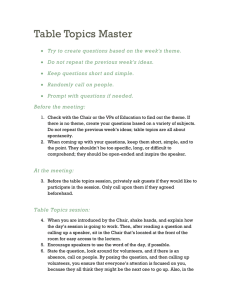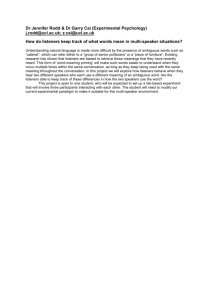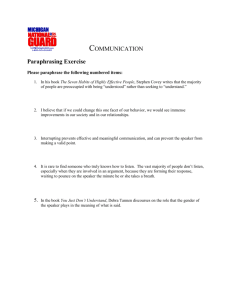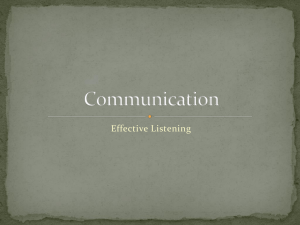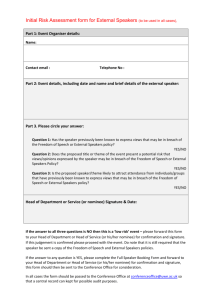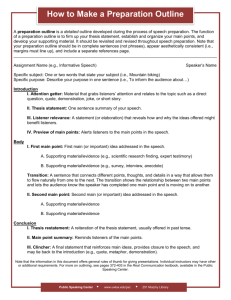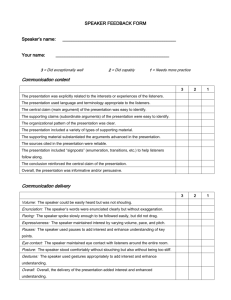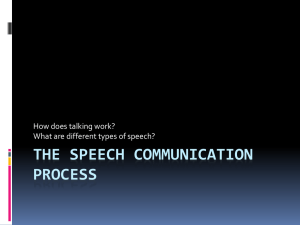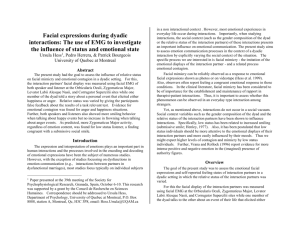Lecture 1
advertisement
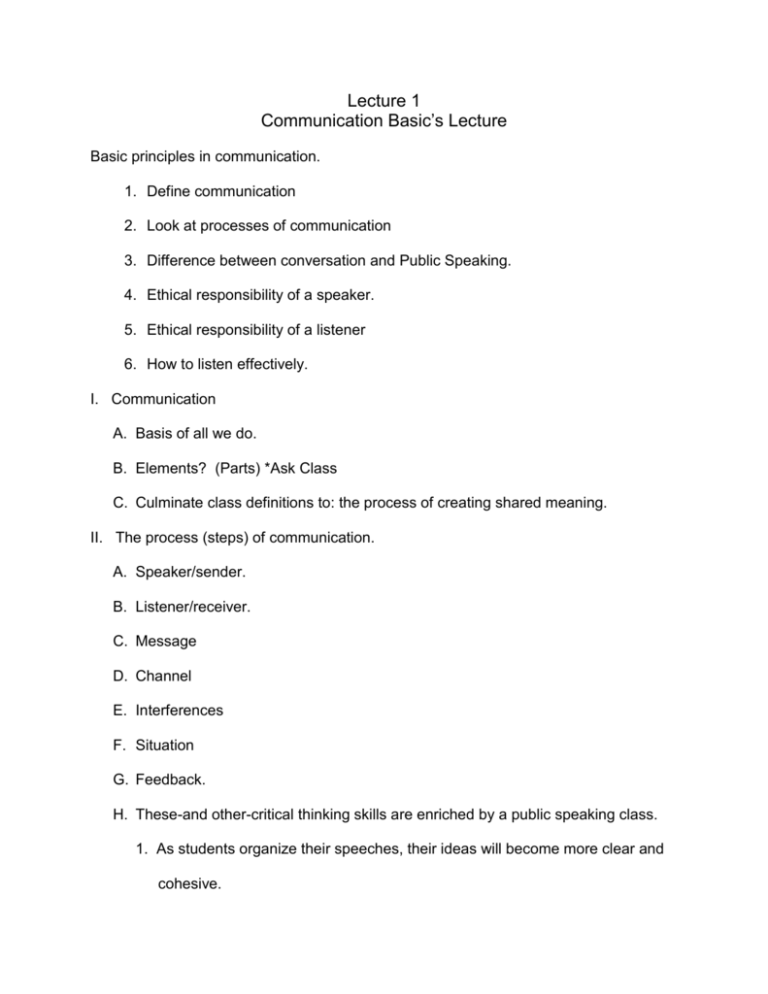
Lecture 1 Communication Basic’s Lecture Basic principles in communication. 1. Define communication 2. Look at processes of communication 3. Difference between conversation and Public Speaking. 4. Ethical responsibility of a speaker. 5. Ethical responsibility of a listener 6. How to listen effectively. I. Communication A. Basis of all we do. B. Elements? (Parts) *Ask Class C. Culminate class definitions to: the process of creating shared meaning. II. The process (steps) of communication. A. Speaker/sender. B. Listener/receiver. C. Message D. Channel E. Interferences F. Situation G. Feedback. H. These-and other-critical thinking skills are enriched by a public speaking class. 1. As students organize their speeches, their ideas will become more clear and cohesive. 2. As students work on expressing their ideas accurately, their thinking will become more precise. 3. As students learn about the role of reasoning and evidence in speeches, they will become better able to assess reasoning and evidence types of situations. III. There are seven elements of the speech communication process. A. Speech communication begins with a speaker. 1. The speaker is the person who presents the message. 2. Successful speakers combine technical skill with personal enthusiasm. B. The message is whatever a speaker communicates to someone else. 1. The goal of a speaker is to have the intended message be the message that is automatically communicated. 2. Achieving this depends both on what the speaker says (the verbal message) and how the speaker says it (the nonverbal message). C. The channel is the means by which a message is communicated. 1. Public speakers may use one or more of several channels-microphone, radio, television, etc. 2. In speech class, the channel is the most direct because listeners see and hear the speaker without any media or electronic intervention. D. The listener is the person who receives the communicated message. 1. Everything a speaker says is filtered through a listener’s frame of reference. a. A listener’s frame of reference is the sum total of his or her knowledge, experience, goals, values, and attitudes. b. Because a speaker and listener are different people, they can never have the exact same frame of reference. 2. Because people have different frames of reference, a public speaker must take care to adapt the message to the particular audience being addressed. E. Feedback consists of messages sent from the listener to the speaker. 1. Most communication situations involve two-way communication, in which the speaker can see how the audience is responding. 2. Successful public speakers learn to interpret the feedback sent by listeners and to adjust their messages in response to the feedback. F. Interference is anything the impedes the communication of a message. 1. Interference can be either external or internal. a. External interference comes from outside the audience-such as a ringing telephone, the noise of traffic, or static in a microphone. b. Internal interference comes form within the audience-such as poor listening skills or lack of concentration. 2. Successful public speakers work to hold their listeners’ attention despite interference. G. The situation is the time and place in which speech communication occurs. 1. Speech communication always takes place in a particular situation. a. A conversation might occur over a candlelight dinner or in a noisy tavern. b. A public speech might be presented in a small classroom, in a large auditorium, or at outdoor graduation ceremonies. 2. Successful public speakers are alert to the situation and adjust their remarks to it. IV. Conversation vs. Public Speaking A. Share similar goals. 1. Inform. 2. Persuade. 3. Entertain B. Require similar skills – organize thoughts, people tailor a message to an audience, tell a story for impact, adapt to feedback. C. 3 Key differences. 1. Public speaking is more highly structured (time limits, listeners don’t interrupt) 2. Public speaking requires more formal language 3. Public speaking requires different method of delivery (conversation has vocalized pauses) (public speaking avoids mannerisms that distract.) V. Ethical responsibility of a speaker. A. Goal(s) should be ethically sound. – Public speaking can be used for worthy or unworthy goals (politics goes both) B. Should be fully prepared for each speech. (By using sound evidence and reasoning) 1. Unprepared speakers waste the time of audience 2. Unprepared speakers may give wrong or faulty info to listeners C. Be honest in what they say: Listeners won’t trust speakers who lie. D. Should avoid name-calling and/or abusive language: Demeaning, degrades the dignity of listeners, can silence listeners. E. Put ethical principles into practice. 1. Plagiarism - rep’ing someone else’s ideas as your own. a. Global – taking an entire speech. b. Patchwork – patches a speech together from 2 or 3 sources. c. Incremental – not giving credit for specific parts (increments) borrowed from others. i. Do your own work. ii. Acknowledge your sources. VI. Listeners also have ethical obligations. A. Should be courteous and attentive B. Should avoid prejudging the speaker. C. Should maintain the free and open expression of ideas. TODAY we’ve 1. Defined communication 2. Put it into perspective thru the model of communication 3. Looked at differences between conversation and public speaking as well as the responsibility of both speakers and listeners and finally examined how we can be better listeners.

